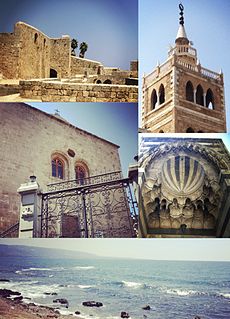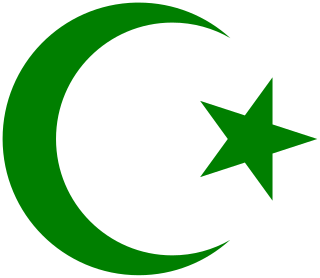Since 2004, a series of bombings and assassinations have struck Lebanon, most of them occurring in and around the capital, Beirut. This wave of bombings began with the assassination attempt on Marwan Hmade, then peaked with the assassination of former Prime Minister Rafiq Hariri on 14 February 2005, which touched off the Cedar Revolution and the withdrawal of Syrian troops. After the massive protests sparked by Hariri's killing, several more bombings hit Lebanon.
On 10 February 2012, two large bombs exploded at Syrian security forces buildings in Aleppo. According to the Syrian government and state media, the blasts were caused by two suicide car bombs. It reported that 28 people were killed and 235 wounded. The bombings took place during the Syrian Civil War and the government blamed armed opposition groups.
Lebanese Sunni Muslims refers to Lebanese people who are adherents of the Sunni branch of Islam in Lebanon, which is the largest denomination in Lebanon tied with Shia Muslims. Sunni Islam in Lebanon has a history of more than a millennium. According to a CIA study, Lebanese Sunni Muslims constitute an estimated 27% of Lebanon's population.
The 10 May 2012 Damascus bombings were carried out using a pair of car bombs allegedly detonated by suicide bombers outside a military intelligence complex in Damascus, Syria. Combined, the perpetrators detonated more than 1,000 kilograms (2,200 lb) of explosives, tearing the facade off a 10-story building. With 55 people confirmed dead and almost 400 others injured, the attack was the deadliest bombing to its date in the Syrian Civil War, though later outpaced by other events.
Rifaat Ali Eid is the leader of the Arab Democratic Party as of 25 December 2015. The party has the largest support of Lebanese Alawites, and its base is Tripoli, Lebanon, in the Jabal Mohsen neighbourhood. Rifaat took over its leadership after his father, former MP Ali Eid, died in 2015.

Between 2011 and 2017, fighting from the Syrian Civil War spilled over into Lebanon as opponents and supporters of the Syrian Arab Republic travelled to Lebanon to fight and attack each other on Lebanese soil. The Syrian conflict stoked a resurgence of sectarian violence in Lebanon, with many of Lebanon's Sunni Muslims supporting the rebels in Syria, while many of Lebanon's Shi'a Muslims supporting the Syrian regime which is led by Bashar Al-Assad, whose Alawite minority is usually described as an offshoot of Shi'a Islam. Killings, unrest, and kidnappings of foreign citizens across Lebanon resulted.
The Battle of Shadadeh was a three-day-long battle fought between government forces loyal to Syrian President Bashar al-Assad and Islamist Al-Nusra Front fighters in the city of Shadadeh, located near the Iraqi border.
The Lebanese–Syrian border clashes are an ongoing series of clashes on the Lebanese-Syrian border caused by the ongoing Syrian Civil War.

Operation al-Shabah was launched in May 2013 by the Iraqi Army, with the stated aim of severing contact between the Islamic State of Iraq and the Levant and the al-Nusra Front in Syria by clearing militants from the border area with Syria and Jordan.
From its inception, the Syrian Civil War has produced and inspired a great deal of strife and unrest in the nation of Lebanon. Prior to the Battle of Arsal in August 2014, the Lebanese Army has tried to keep out of it and the violence has been mostly between various factions within the country and overt Syrian involvement has been limited to airstrikes and occasional accidental incursions.
The following lists events that happened in 2014 in Lebanon.
From its inception, the Syrian Civil War has produced and inspired a great deal of strife and unrest in the nation of Lebanon. Prior to the Battle of Arsal in August 2014, the Lebanese Army has tried to keep out of it and the violence has been mostly between various factions within the country and overt Syrian involvement has been limited to airstrikes and occasional accidental incursions. Since then, the Lebanese armed forces have taken a major part in the frey within Lebanon, and there have been jihadist attempts at invasion which have been repulsed by both the Army and Hezbullah.
In early 2014, the jihadist group Islamic State of Iraq and the Levant captured extensive territory in Western Iraq in the Anbar campaign, while counter-offensives against it were mounted in Syria. Raqqa in Syria became its headquarters. The Wall Street Journal estimated that eight million people lived under its control in the two countries.
Lebanon's role in the Syrian Civil War has been limited, compared to the role of other regional and international actors. Lebanese Republic is not officially involved in the conflict, but has been greatly affected by it and some Lebanese factors have taken an active role in the Syrian War and its spillover into Lebanon.








